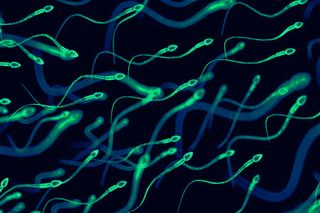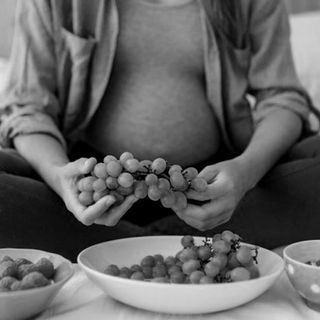
Study: Poor Quality Sperm a Cause of Recurrent Miscarriage
More evidence that men contribute equally to a healthy pregnancy.

A new study has found that faulty sperm can be a cause of recurrent miscarriage. It’s the latest in a slow-growing body of research into how sperm quality affects fertility and pregnancy health.
Specifically, the study linked sperm with higher levels of DNA damage to three or more miscarriages before 20 weeks in the men’s pregnant partners. DNA damage in sperm can be caused by a number of factors, including the fathers’ age — the genetic health of sperm nosedives post-40 — as well as an underlying infection.
“Traditionally doctors have focused attention on women when looking for the causes of recurrent miscarriage. The men’s health — and the health of their sperm — wasn’t analysed,” says the study’s lead author,
Dr Channa Jayasena, from Imperial College London’s Department of Medicine. “However, this research adds to a growing body of evidence that suggests sperm health dictates the health of a pregnancy. For instance, previous research suggests sperm has an important role in the formation of the placenta, which is crucial for oxygen and nutrient supply to the fetus.”
Related on The Swaddle:
Infertility Research Excludes Men, Keeping the Burden of Getting Pregnant on Women
Even when men are included in and/or are the focus of fertility research, studies lack diversity. “Even though studies had increasingly included men over time, single, divorced and transgender men remained missing in many survey settings. So did men from the global south, specifically men from Latin America, North Africa, parts of South Asia and sub-Saharan Africa,” The Swaddle reported in September 2018. While this latest study is small-scale and homogenous, involving only 110 men in the UK, it adds to the nascent foundation of male fertility research that can inform additional, more heterogenous studies in the future.
The new study compared the sperm of 50 men whose partners had experienced recurrent miscarriage, with the sperm of 60 men whose partners had not suffered miscarriage, finding not only twice as much DNA damage among the former samples, but also a four-fold increase in reactive oxygen species. Reactive oxygen species are molecules in seminal fluid that protect sperm from infection. Yet conversely, past a certain point, these molecules can damage sperm cells.
While the research team is now studying what could cause higher levels of reactive oxygen species in seminal fluid, some causes are already known: infection, as well as obesity. It is unclear whether either cause is behind the study’s results; the study participants whose partners had experienced recurrent miscarriage averaged as slightly overweight, though not obese, as well as older (37 years versus 30 years) than the participants whose partners had never experienced miscarriage.
Related on The Swaddle:
Scientists ID Genetic Causes Behind Repeat Molar Pregnancy, Miscarriage
Ultimately, as Jayasena puts it, the new finding “gives us clues to follow.”
“It has taken medicine a long time to realize sperm health has a role to play in miscarriage — and that the cause doesn’t lie solely with women,” says
Jayasena. “Now we realize both partners contribute to recurrent miscarriage, we can hopefully get a clearer picture of the problem and start to look for ways of ensuring more pregnancies result in a healthy baby.”
Liesl Goecker is The Swaddle's managing editor.
Related


How To Boost Executive Functioning Skills in Preschool Kids (Ages 3‑5)
